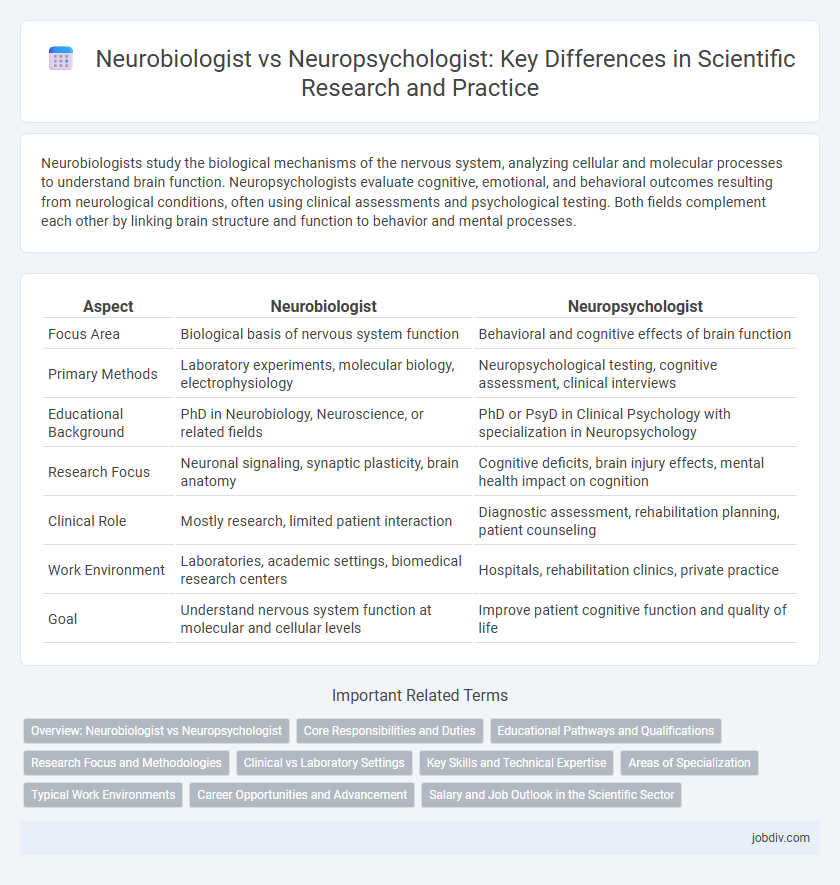Neurobiologists study the biological mechanisms of the nervous system, analyzing cellular and molecular processes to understand brain function. Neuropsychologists evaluate cognitive, emotional, and behavioral outcomes resulting from neurological conditions, often using clinical assessments and psychological testing. Both fields complement each other by linking brain structure and function to behavior and mental processes.
Table of Comparison
| Aspect | Neurobiologist | Neuropsychologist |
|---|---|---|
| Focus Area | Biological basis of nervous system function | Behavioral and cognitive effects of brain function |
| Primary Methods | Laboratory experiments, molecular biology, electrophysiology | Neuropsychological testing, cognitive assessment, clinical interviews |
| Educational Background | PhD in Neurobiology, Neuroscience, or related fields | PhD or PsyD in Clinical Psychology with specialization in Neuropsychology |
| Research Focus | Neuronal signaling, synaptic plasticity, brain anatomy | Cognitive deficits, brain injury effects, mental health impact on cognition |
| Clinical Role | Mostly research, limited patient interaction | Diagnostic assessment, rehabilitation planning, patient counseling |
| Work Environment | Laboratories, academic settings, biomedical research centers | Hospitals, rehabilitation clinics, private practice |
| Goal | Understand nervous system function at molecular and cellular levels | Improve patient cognitive function and quality of life |
Overview: Neurobiologist vs Neuropsychologist
Neurobiologists study the structure, function, and development of the nervous system at the cellular and molecular levels, often conducting laboratory research involving neural pathways and brain biochemistry. Neuropsychologists focus on understanding the relationship between brain function and behavior, employing cognitive assessments and clinical techniques to diagnose and treat neurological disorders. Both fields contribute to neuroscience; neurobiologists provide insights into neural mechanisms, while neuropsychologists apply this knowledge to improve mental health and cognitive function.
Core Responsibilities and Duties
Neurobiologists investigate the cellular and molecular mechanisms of the nervous system, often conducting laboratory experiments to understand neural functions and disorders. Neuropsychologists assess cognitive, emotional, and behavioral functions through clinical evaluations, using neuroimaging and psychological testing to diagnose and treat brain-related conditions. Both professionals contribute to neuroscience, with neurobiologists emphasizing biological processes and neuropsychologists focusing on cognitive and behavioral outcomes.
Educational Pathways and Qualifications
Neurobiologists typically pursue a Ph.D. in neuroscience or related fields, emphasizing extensive laboratory research and biological mechanisms of the nervous system. Neuropsychologists generally obtain a doctoral degree in clinical or counseling psychology with specialized postdoctoral training in neuropsychology, focusing on brain-behavior relationships and assessment. Both disciplines require rigorous education but diverge in their emphasis on experimental neuroscience versus clinical practice and cognitive evaluation.
Research Focus and Methodologies
Neurobiologists concentrate on the cellular and molecular mechanisms of the nervous system, employing techniques such as electrophysiology, neuroimaging, and molecular biology to investigate neural function and neuroplasticity. Neuropsychologists focus on brain-behavior relationships, using neuropsychological assessments, cognitive testing, and clinical interviews to evaluate the impact of brain injuries, neurological disorders, and cognitive impairments on behavior. Both disciplines contribute valuable insights into brain function, but neurobiologists emphasize biological processes while neuropsychologists emphasize behavioral and cognitive outcomes.
Clinical vs Laboratory Settings
Neurobiologists primarily conduct research in laboratory settings, focusing on cellular and molecular mechanisms underlying nervous system function using techniques such as electrophysiology and neuroimaging. Neuropsychologists operate mainly in clinical environments, assessing and treating cognitive, emotional, and behavioral effects of brain disorders through neuropsychological testing and therapeutic interventions. The distinction lies in neurobiologists investigating neural processes at a biological level, while neuropsychologists apply this knowledge to diagnose and manage patient conditions.
Key Skills and Technical Expertise
Neurobiologists possess advanced expertise in cellular and molecular neuroscience techniques, including electrophysiology, neuroimaging, and genetic analysis, enabling detailed study of brain function and neurobiological mechanisms. Neuropsychologists specialize in cognitive assessment, behavior analysis, and neuropsychological testing, with skills in interpreting brain-behavior relationships and diagnosing cognitive impairments. Both fields require proficiency in research methodologies, but neurobiologists focus on laboratory-based technical expertise while neuropsychologists emphasize clinical evaluation and therapeutic intervention strategies.
Areas of Specialization
Neurobiologists specialize in the cellular and molecular mechanisms of the nervous system, often focusing on neuroanatomy, neurochemistry, and neurophysiology to understand brain function at a biological level. Neuropsychologists concentrate on the relationship between brain function and behavior, specializing in cognitive assessment, brain injury rehabilitation, and psychological testing to diagnose and treat neurological disorders. Both fields contribute to neuroscience but differ in emphasis on biological processes versus behavioral outcomes.
Typical Work Environments
Neurobiologists typically conduct research in laboratories within universities, hospitals, or specialized neuroscience institutes, focusing on understanding the biological mechanisms of the nervous system. Neuropsychologists commonly work in clinical settings such as hospitals, rehabilitation centers, and private practice, where they assess and treat cognitive and behavioral effects of neurological disorders. Both professionals may also be affiliated with research organizations, but neurobiologists emphasize experimental studies, whereas neuropsychologists prioritize patient evaluation and therapy.
Career Opportunities and Advancement
Neurobiologists primarily pursue careers in research institutions, pharmaceutical companies, and academia, focusing on the biological mechanisms of the nervous system. Neuropsychologists often find opportunities in clinical settings, hospitals, and rehabilitation centers, applying psychological principles to diagnose and treat cognitive impairments. Advancement in neurobiology typically involves leading research projects or securing grants, while neuropsychologists advance through clinical specialization and obtaining board certification.
Salary and Job Outlook in the Scientific Sector
Neurobiologists typically earn an average salary ranging from $70,000 to $120,000 annually, with job growth driven by advancements in neuroscience research and biotechnology. Neuropsychologists command higher salaries, often between $85,000 and $140,000, supported by strong demand in clinical settings and cognitive health assessments. Both fields experience positive job outlooks, but neuropsychology's integration into healthcare and rehabilitation contributes to a slightly faster employment growth rate.
Neurobiologist vs Neuropsychologist Infographic

 jobdiv.com
jobdiv.com